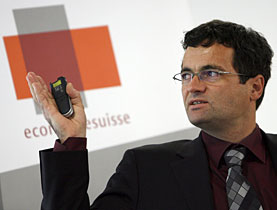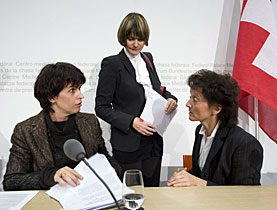Bilateral accords bring good fortune for firms

Switzerland's bilateral ties with the European Union are good for business and employment, the Swiss Business Federation (economiesuisse) has concluded.
The labour treaty in particular has helped boost the Swiss gross domestic product, according to an economiesuisse study released on Friday on the impact of the bilateral agreements on the Swiss economy.
The findings show no negative repercussions on the job market as a result of the treaty and that could go some way towards allaying fears among opponents. In fact, the study says, there has been no impact on unemployment, and the average level of wages has gone up since the labour accord came into force in 2002.
“A significant proportion of the newly employed foreigners in Switzerland complements the Swiss workforce,” said Jan-Egbert Sturm, head of economiesuisse.
“This migration of workers, who are for the most part highly qualified, has in fact reduced the rate of unemployment among the foreigners resident in Switzerland.”
The government last month announced that the free movement accord, as it is also known, has boosted the economy by more than one per cent – or up to SFr5 billion ($4.2 billion) annually.
It has also led to an increase in private consumption and real disposable income.
Specialist staff
The accords had almost universally positive feedback from the members of economiesuisse who were surveyed in spring 2008 for the study.
A total of 99 per cent said the agreements were “largely” or “very largely” significant for the economy. Eighty per cent said the labour treaty was essential for employers to hire qualified and specialist staff.
Despite the economic slowdown employers are still not finding enough qualified people to fill all vacancies, the Swiss Employers Association said.
“Establishing quotas is unwise,” said association head Thomas Daum, adding that without the treaty “businesses would not easily be able to replace an employee from within the EU and our diplomas would not be recognised at the European level”.
He said opponents of the labour treaty should finally admit that concerns about negative impacts on wages and employment levels were unfounded.
Both economiesuisse and the Swiss Employers Association warned of serious consequences in the event of a no vote in Switzerland’s national referendum in February on extending the labour treaty to two new EU members.
“Vital for businesses”
Switzerland and the EU have concluded 16 bilateral accords – mainly covering trade and labour as well as asylum, customs and tax issues.
Voters first approved the labour treaty in 2000 and confirmed it in 2005. But under the terms of the first package of bilateral treaties, Switzerland can review the labour deal by mid-May 2009.
Refusal to continue the treaty would result in the whole set of bilateral accords being suspended.
Rudolf Minsch, chief economist at economiesuisse, says under such a scenario Swiss firms’ access to the main export market would be impeded and negative economic and job market consequences would follow. Export businesses and their many suppliers and partners would be affected, he says.
“In the event of a no vote, we would have to beg Brussels for new negotiations. This is certainly not in the interests of Switzerland.”
He warned that it would take some time for a new agreement to be ironed out, during which time Swiss companies would be penalised when compared with their competitors in the European common market. A yes vote would ensure companies had access to the market under the same conditions as European businesses.
“The continuation of bilateral agreements is vital for many businesses, particularly in the current situation,” he added.
swissinfo with agencies
Swiss voters in 1992 narrowly rejected joining the European Economic Area treaty, a halfway house to EU membership.
Instead Switzerland and the EU concluded 16 bilateral accords, which came into force in 2002 (extended in 2006) and 2005 respectively. They mainly cover trade and labour as well as asylum, customs and tax issues.
Voters approved the labour treaty with the old 15 EU member states with a 67% majority in 2000. It took effect from 2002. A second vote extended the labour treaty to ten new member states with a 56% majority in 2005.
Under the terms of the first package of bilateral treaties with Brussels, Switzerland can review continuing and extending the labour deal to the latest two EU member states, Bulgaria and Romania, by mid-May 2009. Refusal to continue the deal would result in the whole set of accords being suspended.
The rightwing Swiss People’s Party is the only main political party to oppose the agreement. Small rightwing groups collected the necessary signatures for a nationwide vote in February.
All the other main parties, including dissident members of the People’s Party, as well as the business community have all come out in favour.
The government launched a campaign at the start of December underlining the economic and political importance of the key labour treaty.
The Swiss Business Federation was created through the merger in 2000 of the Swiss Federation of Trade and Industry and the Society for the Promotion of the Swiss Economy.
Its members include 100 trade and industry associations, 20 cantonal chambers of commerce and individual companies in the financial, manufacturing, advertising, media, construction, engineering, chemicals, pharmaceutical, technology, media and tourism sectors.
It also represents the interests of many small and medium-size enterprises and works together with the Swiss Employers Association. The umbrella organisation also has the support of around 30,000 companies, employing 1.5 million people in Switzerland.
It plays an important role in the Swiss economy by representing the views of its members to the government and to the public.

In compliance with the JTI standards
More: SWI swissinfo.ch certified by the Journalism Trust Initiative



You can find an overview of ongoing debates with our journalists here. Please join us!
If you want to start a conversation about a topic raised in this article or want to report factual errors, email us at english@swissinfo.ch.